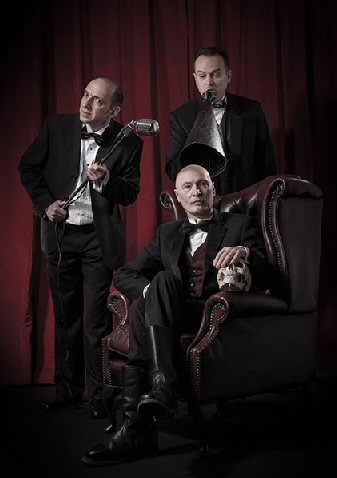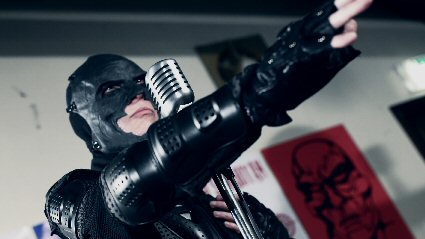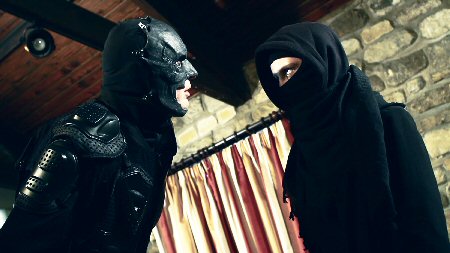Vigilante superheroes aren�t just the domain of Hollywood and the big comic companies as Stu Willis found when he checked out the wild Brit Indie feature THE BAD SAMARITAN MUST DIE! And he had so much fun he donned his cape and tracked down filmmaker Andrew Leckonby to discuss his work�

Stu: Hi Andrew. Thanks a lot for granting us an interview with you. THE BAD SAMARITAN MUST DIE! is an excellent example of low-budget UK genre filmmaking, and the special edition DVD really is a thing of beauty.
Andrew: Thank you.
Stu: Can I ask, how did you get started in the world of film direction?
Andrew: Feature-film scriptwriting was what I wanted to do despite yearning to be a film director when I was a kid. I had been on a degree course with a minor in Scriptwriting. I then worked in an office whilst I wrote scripts in the evenings, sent them off to mainly BBC Drama and BBC Films but just collected many rejection letters during that time. Then I had chance of editing �a making of� a short film, a friend of mine had shot on a cheap video camera and was only for his course work. The short film was entitled "Insomnia" and was shot in the North-East of England and starred a pre-�Lord of the Rings� Andy Serkis � he also got to interview the actor during a break. I hadn�t done any editing at all before this but found I had a knack for it, so when I learnt there was a 16-week intensive filmmaking course, been run in Newcastle-upon-Tyne, I went for it and edited a couple of projects we made but not actually got to make any of my own scripts. So after that inspirational course I clubbed together with a friend, I�d met on the course, and bought a professional mini-dv camera and decided to make our own short film, taking turns in directing � and sometimes starring in � for no money whatsoever.
Then came a bit of a break when I sent in a film treatment to Northern Film and Media, for a scheme called �Stingers�, the Newcastle-based organisation teamed up with UK Film Council (now replaced with Creative England) to run an annual scheme for eight films to be made with new up and coming filmmakers - unfortunately the programme has now discontinued. My five-minute short was picked, the comedy �Lock and Key� (2004) was about a man who is about to go on a date but is drawn back to his house every time he tries to leave, believing he has left a window open, or the oven on, until he finally locks himself out of his house. Although I had directed three other very small shorts before then, I count this as really my first proper short. It was a professional shoot where everyone got paid, which was very nice. I knew I wanted to continue directing.
Stu: Is it fair to say there aren't many outlets for such endeavours in the North of England? Did you ever consider moving closer to London, where presumably more options would present themselves?
Andrew: I had been close to London when I did my degree in University of Bedfordshire, in Luton, and many fellow students did move to London as most of them had done the Media Production course, while I had studied Media theory. I saw myself as a scriptwriter, hence, I could write anywhere and my partner at the time wanted to live in Newcastle-upon-Tyne, so that�s where I ended up. I must say I did wonder when making my own films up in Newcastle would London be a better fit since the network is obviously much bigger but the cost and the whole London mind-set is something that leaves me cold.
Stu: A number of your short films are available to view on YouTube. Some filmmakers in your position are precious about giving away their work for free. What's your philosophy?
Andrew: I think filmmakers are becoming a little less worried about their films being shown for free, at least after a run at the festivals � the organisers usually demand that they�re not available on-line, only as private screeners for them to view. My philosophy is I want my films to be seen by as many people as possible. We even allowed our first feature �The Bad Samaritan Must Die!� to be seen on YouTube for free for a limited time a couple of times. What I�ve done with the shorts is I have put them on YouTube after a year or two of doing the rounds at festivals.
Stu: Of the short films, I have to say films like "Fractured Boy" and "Air" really struck me. They're expertly made, but conceptually I found them a tad challenging. That's not a bad thing, but could you elaborate on the themes these films are addressing?
Andrew: �Fractured Boy� is our avant-garde film, which was a bit of a head-scratcher for both myself and my writing partner John Raine. We wanted to have a dream-like quality. Our Director of Photography suggested using a smoke-machine and to use a dolly and crane whenever possible � he did a marvellous job. It is very much a psychological piece. We wanted to feel trapped in the nightmare this man-child is in. He has died and being forced to re-live the accidental death of his father, who he blames his mother for. His wish-full thinking is that he would kill her if he had his time again, as a more capable adult. In hell he is able to do this. Being hell meant he had to relive the same evening with his estranged parents over and over. These are characters from a Stephen Laws short story entitled �The Fractured Man�, which we intended to do as a feature, which we see this love-hate relationship with his mother as he kills people who had bullied him as a child, only each time he must mutilate himself to become more whole after each murder. Much more gruesome than �Fractured Boy� is � one day we may actually make this.
While �Air� is a little less deep, misconception is something that has fascinated me. The films of Alfred Hitchcock were shown a lot on TV when I was growing up, the clues always pointed to murder. I just wanted to take that and turn it on its head � so it starts in the genre of a thriller then becomes a black comedy.

Stu: How did your relationship with your THE BAD SAMARITAN MUST DIE! co-director John Raine come about? And can you discuss what it is you both bring to your company, Hydra-X Films?
Andrew: After making �Lock and Key� I joined a group, Lost Weekend Films, with five other like-minded individuals who also wanted to up the ante writing and directing our own short films, by taking turns making one each � actor and writer John Raine was one of them. I made �Air� (2006), but then when it came to John�s turn he asked to team up with me since he hadn�t directed before and so we did, �Repercussions�, which was a great experience for us both.
The film collective disbanded, I partnered up with John Raine to form Hydra-X Films, which we have made three shorts and one feature in total so far. We have learnt a lot from each other. I�m good with structure, while John has a very distinct voice with dialogue. He is an actor and knows that every word counts. He is also very succinct with descriptions and uses slang which I was a little afraid of at first, thinking people may not get it but we have found people loving that they read our first Bad Samaritan script.
Stu: Raine's performance in SAMARITAN is full of nervous energy and danger - does he possess these traits in real life?
Andrew: Oh, yes! Not particularly the danger but he has come from stand-up, where he played a character called Howka Charvaz, who�s loud and very dim. John likes to play larger than life characters. With Dan Maitland, aka The Bad Samaritan, he will quite literally hit you with a sledgehammer to get a point across!
Stu: And how is it co-directing? Are there allocated areas of production you each work on, or do you find yourself occasionally in conflict with one another?
Andrew: I�m more involved with what�s in front of the camera, the kind of shots and action, while John directs the actors. But we do cross over a bit, as John likes to have input on what shots he would like. Of course if we don�t agree then we usually shoot both ways and see how it looks in the edit.
Stu: The film is a stylish, witty, brisk and wildly entertaining one. Can you tell us a little about some of the talent involved in its making?
Andrew: In the writing of �The Bad Samaritan Must Die!� we originally had The Orphan as a twenty-something young man but we soon realised it wouldn�t work half as well. We wanted him to be vulnerable, how better than not just halve his age but also change his sex. It was only during the auditions we realised this as we had more actresses auditioning than male actors. Both John and I loved the look of Nikita Rachel Shepherdson. And she brought real attitude to the role. Some of the casting happened to be people we knew. In the case of Gary Colman who plays Superintendent Donald, I met him at London Screenwriters� Festival 2011, and just knew he would be great in the role. While John knew an actress who would be perfect, as police psychiatrist Dr Holly Samuels, to play alongside him. We manage to get her just before she moved back home to New Zealand, as we filmed the police conference scenes back in January 2012, six months before we started principal photography that were done over several weekends from June to October.
John Scott, who plays Detective Inspector Steve Nixon, was the first person cast other than John Raine as The Bad Samaritan, whilst writing the script. John Raine would always read out Steve�s lines in a thick Scottish accent � so we knew it would really work, even more so when John Scott rehearsed with John Raine a couple of evenings before the shoot.
Andy Roughan was our first choice for Director of Photography, after working with him in the horror short �Stephen Laws� The Secret�. He had his work cut out for him as he had no gaffer or camera assistant to work with, but his always calm demeanour on set served him well, as we were both really happy with his work.

Stu:... And the DVD is clearly a labour of love. As someone who is a lover of the physical format, the extra effort put into this package is really appreciated by me. Care to elaborate on its preparation?
Andrew: Being avid DVD and Blu-Ray collectors ourselves we both knew we wanted to do something special. A �Making of� in the guise of �Behind the Mask� was a given from the start, so we got Chris Tritschler in to film our first weekend of principal photography and grab some interviews. We also got him for the night�s cast and crew screening at the same location. We had used original music by Graham Lee, which meant we had a CDs worth to use, some of the music is inspired but not actually in the film but may be used in the next film. John Raine has always wanted it to create a graphic novel based in the world of The Bad Samaritan so we decided to put together a short comic, portraying events prior to �The Bad Samaritan Must Die!�
Stu: As much as the film revels in dark humour, there are some serious undercurrents to it. Clearly, there's a strong political element to its sentiments?
Andrew: The Scorcher is obviously very much like a certain tabloid, talking down to its readers and making light of this vigilante on the streets. The police have no idea how to stop him. He is becoming more and more the hero of the people as people begin to emulate him � mainly the youths on the streets that he�s been fighting. We will see more of a political growth in the next film as certain people high up take note of The Bad Samaritan and see how he can be put to good use. Basically this is the rise of Hitler, who just happens to wear a mask.
Stu: Could you also elaborate on the role of The Orphan and the nod to absent fathers that her character appears to allow for? It makes for a curiously disturbing final act in the film.
Andrew: Although The Bad Samaritan features in this story, we wanted it to be more about The Orphan, the actual criminal and how they have gotten to be that way. She has a mother physically present but she is definitely not there in spirit, as she just drinks and smokes in front of the telly all day and night. The father has died, and in the eyes of The Orphan deserted her. We forget that in many cases the criminal delinquents come from broken homes, usually the father has left but in this case we wanted to make it more permanent. That in this case the supposed crime-fighter is actually a lot worse than criminals on the streets as he likes maiming and killings these poor kids. The Orphan may be a criminal but all she wants is direction in her life and she thinks this psycho in a mask will take her under his wing but he merely sees her just another feral kid who needs a good dose of GBH.
Stu: I'd like to know a little more about the SAMARITAN series if possible? For example, there are two more films anticipated. What do these hold in store for viewers?
Andrew: The next film �Dawn of The Bad Samaritan� will be a prequel, the origin story of Dan Maitland becoming The Bad Samaritan, which we have had in a drawer for a couple of years. Blowing the cobwebs off it John and I are writing another few drafts to get to where we want it, as the character has changed a little since we originally wrote it. This will have The Orphan appear in the two important scenes when she meets up with him and continues further on but that will be it as this is The Bad Samaritan story. There will be more of his best and only friend Detective Inspector Steve Nixon, and how their friendship is put to the test when Dan ups the ante with his campaign of terror on the streets. It will be a two-hour film opposed to 50-minutes that �The Bad Samaritan Must Die!� runs at. We see our first film as more of a companion piece � you don�t need to have seen it to enjoy the next instalment.
In the end credits we said Dan would return in �God Save The Bad Samaritan�, this will now be the third story. Another two-hour film, while �Dawn�� is the rise of Dan Maitland, the final film will be his downfall, when he meets a Superhuman being who could have been sent from the heavens to stop the now dictator-like figure.
Stu: Who are your cinematic influences? Judging from your shorts and SAMARITAN, there will be quite an interesting list. Your films aren't the usual gorefests often offered by independent filmmakers these days, but rather disquieting horror-thrillers that get the brain working.
Andrew: I have a wide-range of influences, Alfred Hitchcock, Dario Argento, the scripts of John Hodge, Tarantino, Christopher Nolan, Brian DePalma, Sam Raimi, Edgar Wright, John Carpenter pre-1990s, Night of the Demon and The Cat People for �Stephen Laws� �The Secret� and George Romero for social commentary, oh and I do like to see some gore.
Stu: Outside of the SAMARITAN series, do you have any other films on the go or in the pipeline?
Andrew: I have two horror and one thriller features that I�d like to make in the next five years, most likely after �Dawn of The Bad Samaritan� and before �God Save�� �Hell Spawn� is a horror road-movie about a grieving son who brings his father back from the dead, only to discover he was in hell and they want him back! �Melt� is a twisted love story set in a room with no windows, no doors, only a scrap pile of items in the middle of the room that appear to have a life of their own � think "a demented Toy Story", as John Raine commented when he read my script. The third is a thriller whereby Graham has just killed his wife and is journeying across country to meet up with his one true love, who happens to be married to his gangster boss. Graham listens to songs on his Ipod, while meeting people who may or may not end up on his kill list.
Stu: Thank you very much for your time, I wish you the best of luck with your film.
Andrew: Thank you.
Special thanks to Andrew Leckonby and Hydra-X Films